
Sorbonne University honours eight outstanding achievers
On March 25th, Sorbonne University will award the title of Doctor Honoris Causa to eight international trailblazers. This prestigious distinction, awarded by the world's leading universities, is awarded in recognition of their exceptional contributions to the arts, literature, science and technology - and to France or our university.
The ceremony will be broadcast live on Sorbonne University's Youtube channel.
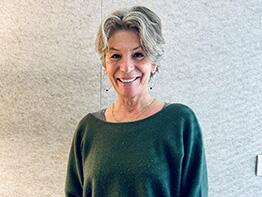
Giovanna Mallucci, clinical neuroscientist specialising in neurodegenerative diseases
Giovanna Mallucci is a Clinical Neuroscientist and founding Principal Investigator at Altos Labs, Cambridge Institute of Science. She is internationally recognised for her innovative work on neurodegeneration and new therapeutic approaches for Alzheimer's and related diseases, leading to clinical trials.
Professor Giovanna Mallucci was born in 1963 in the United Kingdom. After having studied medicine at the University of Oxford and University College London, she specialized in neurology. She completed her scientific training with a doctorate from Imperial College in London, under the supervision of Professor John Collinge. Her research led to outstanding contributions in the study of prion diseases.
In 2008, she joined the Toxicology Unit at the UK Medical Research Council and, in 2014, she was elected van Geest Professor of Clinical Neurosciences at the University of Cambridge. She became Director of the UK Dementia Research Institute at the University of Cambridge in 2017 and has led several teams of researchers. Her groundbreaking research has contributed to significant advancements allowing the discovery of the reversibility of early degeneration and the understanding of the role of unfolded protein response (UPR).
In 2017, she was elected to the Academy of Medical Sciences, and in 2021 she was awarded the Potamkin Prize for Research in Pick's and Alzheimer's related diseases, recognizing the historical and innovative nature of her research in the field.
Building on her mechanistic and translational research in neurodegenerative diseases, and while maintaining her affiliation with the University of Cambridge, she joined Altos Labs, a new research enterprise focused on curing disease and restoring cell health through rejuvenation, as a founding Principal Investigator.
Her scientific excellence has significantly advanced the identification of treatments for dementia and degenerative diseases.
Driven by her passion for understanding fundamental mechanisms underlying brain cell death, she is driven to translate these discoveries into new therapies. This enthusiasm and dedication to science have led to the identification of two groundbreaking drugs, including Trazodone hydrochloride—now marketed as an antidepressant—effective in preventing neurodegenerative diseases in mice, now being tested in humans.
Beyond her undeniable scientific achievements, Professor Mallucci’s vibrant, dynamic, and generous personality is widely celebrated by her peers, along with her excellent sense of humor and her dedication to the common good.
This distinction honors her freedom of expression, which is essential in her field, and her voice serves as a model to countless women scientists of today and tomorrow.
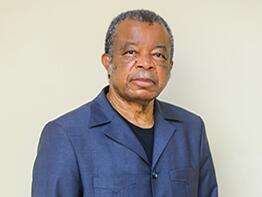
Jean-Jacques Muyembe, co-discoverer of the Ebola virus
A world-renowned virologist, Jean-Jacques Muyembe co-discovered the Ebola virus in 1976 and has devoted his career to fighting epidemics. Director of the National Institute for Biomedical Research in Kinshasa since 1998, he also co-invented the mAb114 monoclonal antibody against Ebola.
Professor Muyembe, globally recognized virologist, has devoted his career to the fight against different epidemics. Born in 1942 in the Democratic Republic of Congo (DRC), he graduated in microbiology at the University of Kinshasa in 1969. He obtained his doctorate in virology at the Belgian university UCLouvain in 1973.
Upon his return to the DRC in 1974, he worked on the cholera outbreak and the Ebola hemorrhagic fever, for which he was one of the co-discoverers. In 1978, he was nominated dean of the University of Kinshasa Medical School. His works and his commitment led him to join the Pasteur Institute of Dakar (IPD) where he worked in close collaboration with the Centers for Disease Control and Prevention (CDC) in order to study the Ebola and Marburg viruses.
Nominated national coordinator of the Ebola Emergency Response in 1995, his different research studies highlighted the epidemiological aspects of the disease, including the amplifying role of hospitals and funeral rites.
His research and extensive field expertise made him the natural choice to lead the National Biomedical Research Institute (INRB) of the DRC starting in 1998. Under his leadership, the INRB grew into a center of excellence, driven by his innovative approach to training new generations of scientists. Convinced that the epidemiological crisis cannot be solved without a strong international partnership dynamic, he works in order to make the INRB an international center for emerging infectious diseases.
He plays a crucial role in the authentication of the origin point of HIV in Kinshasa, of Ebola, and, more recently, when he was tasked by President Félix Tshisekedi, in the fight against the SARS-CoV-2 epidemic. In 2020, he developed a treatment called 'Ebanga,' which was approved by the U.S. FDA to combat Ebola.
As a pioneer in epidemic control measures, the protocols developed by Professor Muyembe inspired numerous Western public health policies during the SARS-CoV-2 pandemic. He has received numerous awards and honors and was in Time's 100 Most Influential People of 2020.
Convinced that raising awareness among communities and taking local customs into account are major factors to take into consideration during an epidemic, he is source of inspiration of numerous scientists from Africa and around the world.

Chimamanda Ngozi Adichie, Nigerian writer
Renowned Nigerian writer Chimamanda Ngozi Adichie has conquered the international literary scene with novels such as "The Purple Hibiscus" and "Americanah". She was elected to the American Academy of Arts and Sciences in 2017.
The work of Chimamanda Ngozi Adichie, Nigerian author writing in English, is being written before our eyes. She has shaped a global reputation through three novels to date (the fourth, Dream Count, will be released in March 2025), numerous short stories, some of which have been gathered in one volume, a play, a children’s book, and essays, including Notes on Grief (2021) about her father’s death. She claims a multiple belonging: Igbo, Nigerian, African. Partially living in the USA, she is deeply familiar with the complexities of migrations and diasporas. Chimamanda Ngozi Adichie defends strong political stands. In We Should All Be Feminists (2014) and Dear Ijeawele, or A Feminist Manifesto in Fifteen Suggestions (2017), she attacks the inequalities between women and men, opens pathways, calls for change. Women must be the authors of their own destiny, and this political stand runs throughout all her fictional work.
Born in 1977, she grew up with the lingering memory of the Biafran War, which had ended seven years before her birth but left a lasting trauma within her family. The novel Half of a Yellow Sun (2006) provides an impressive chronicle of this. She knows the political history of the country, the struggles for democracy, and Purple Hibiscus (2003) bears the marks. The power of this political struggle is all the greater because her narrative presence is subtle. She also dissects the effects of colonialism, through Christian missions that have shaped individuals through violence and submission. She questions the distance between Nigerian communities in the USA and the families that remain in the homeland, without forgetting England: her third novel Americanah (2013) maintains through her words the relationships that persist beyond space and time. In this novel, she explores identities as they form and unravel, dynamics of domination, and encounters with racism.
Her work is part of the tradition of a Nigerian literature in English: Chinua Achebe, for whom she has expressed her admiration, Christopher Okigbo, who died during the Biafran War, and Wole Soyinka, Nobel Prize laureate in Literature. It is also through her sense of detail, through the evocation of a flower, of dusted and broken figurines, of braided hair that Chimamanda Ngozi Adichie shapes a familiar universe from book to book. The universal quest through individual stories animates her writing and particularly within the walls of Sorbonne University in Paris.
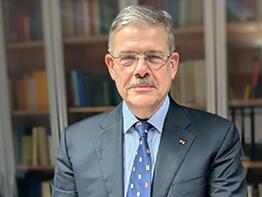
Oliver Primavesi, expert on Aristotle, Leibniz Prize laureate
A classic scholar of Greek antiquity, Oliver Primavesi is Professor of Greek Philology at Munich's Ludwig Maximilian University. A specialist in Aristotelian thought, he has received numerous awards, including the Leibniz Prize in 2007.
Oliver Primavesi, born on February the 17th, 1961, in Offenbach am Main in Germany, has been an ordinary professor (the highest rank of a professor in his country) in Greek philology at Ludwig Maximilian University in Munich since 2000. After an initial course in Latin and music at the conservatory of Frankfurt, he opted for a career as a Hellenist. He is one of the internationally most renowned specialists in Greek language and texts, as well as in ancient thought in general. His discoveries as a philologist in Greek philosophy – he has reconstructed significant ancient texts that were thought to be lost and has improved the texts from several Greek works – have earned him numerous prestigious awards, including the Reinach Prize from the Association for the Promotion of Hellenic Studies and the Gottfried Wilhelm Leibniz Prize.
His work explores all the aspects of the Greek civilization in his creative articulation of the philosophy, sciences, literature, and fine arts. Since his thesis on the Aristotelian doctrine of dialectical argumentation, Oliver Primavesi has relentlessly studied classical Greek philosophy. He is an experienced specialist in Aristotle, and, in this field, he is both a virtuous editor (his critical edition about Metaphysics Alpha and the treatise On the Movement of Animals go down in history) and a commentator without equal. He is also one of the leading contemporary experts in presocratic studies and his reconstruction of the Empedoclean system is one of the noteworthy events of these last decades in the field of classical philology. Combining critical edition of unpublished texts - including the famous “Strasbourg Papyrus” that he published in collaboration with the Belgian papyrologist Alain Martin in the beginning and later alone in several monographs – with extensive studies on physical, religious, and ethical thoughts of Empedocles of Agrigentum, Oliver Primavesi has provided a new perspective on the latter and on the entire Greek philosophy of the 5th century. To these works are added first-rate contributions concerning philosophy, poetry, art history, as well as different aspects of Greek lyric poetry.
Finally, Oliver Primavesi is a thoughtful researcher when it comes to questions about the reception of the Greek heritage, heritage, from medieval and Renaissance Europe via Winkelmann to Nietzsche and Brecht. He is one of the researchers who has contributed the most to a renewed reflection on the meaning of classical philology and its place in the future of European thought.

Rémi Quirion, expert in neuroscience research
A neuroscience researcher and Quebec's first Chief Scientist, Rémi Quirion has contributed to a better understanding of diseases such as Alzheimer's and depression. The author of more than 750 publications, he is one of the most highly cited neuroscientists in the world.
Rémi Quirion, Doctor in pharmacology at the University of Sherbrooke and post-doctoral researcher at the National Institute of Mental Health in Washington, is one of the founding members of the International Network for Government Science Advice. Appointed Chief Scientist of Quebec in 2011, his steadfast commitment in favor of scientific diplomacy and international collaborations has significantly contributed to strengthening the ties between France and Quebec.
Until his appointment, he was Vice Dean of Life Sciences and Strategic Initiatives at the Faculty of Medicine at McGill University as well as senior advisor at the university. Furthermore, he was scientific director of the Douglas Research Centre, professor of psychiatry at McGill, and executive director of the Canadian Institutes of Health Research's International Collaborative Research Strategy on Alzheimer's Disease. His research have greatly contributed to a better understanding of the role of the cholinergic system in Alzheimer's disease, of the neuropeptide Y in depression and memory, and of the calcitonin gene-related peptide implicated in pain and opioid tolerance.
Throughout his various roles, he has fostered large-scale scientific collaborations between Quebec institutions, such as Laval University, and Sorbonne University. These efforts have advanced innovation and academic excellence in the field of health, environmental sciences, and social sciences. Under his guidance, these partnerships have yielded innovative solutions to global challenges, strengthened the international visibility of French-speaking research, and helped train a new generation of researchers.
Author of more than 750 publications in recognized scientific journals, Rémi Quirion is one of the most cited neuroscientists worldwide. Recipient of numerous awards and honors, including the National Order of Quebec in 2003 and the Order of Canada in 2007, he was promoted to Officer in the Order of Academic Palms of the French Republic in 2015 for his participation in the development of Franco-Quebec research relations.
As a visionary and a traolblaser, he embodies the idea of an open and collaborative science that builds bridges between scientific and academic cultures while committing himself to making research a driver of shared progress.
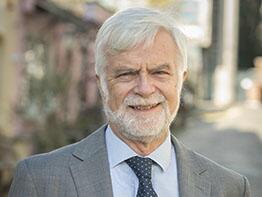
James Ferguson Skea, Chairman of the IPCC
James Skea, a Scottish climatologist, has been Chairman of the Intergovernmental Panel on Climate Change (IPCC) since 2023. His work focuses on energy, climate change and technological innovation.
James Ferguson Skea, born in 1953, is a British scientific specialist in renewable energy economy and environmental policies. Holding a master's degree in mathematical physics from the University of Edinburgh since 1975 and a doctorate in energy research from the University of Cambridge since 1978, he worked as a research assistant at the latter until 1981 and was then invited by Carnegie Mellon University as an assistant professor in the field of energy security and environmental policies.
In 1983, he joined the University of Sussex in England where he was employed as a professor and then Director of the Policy Studies Institute from 1998 to 2004. Since 2009 he has been a professor emeritus of sustainable energy at the Centre for Environmental Policy in the Faculty of Natural Sciences at Imperial College London, as well as a researcher in energy strategy at the Research Councils UK from 2012 to 2017.
Member of the United Kingdom's Committee on Climate Change from 2008 to 2018 he has chaired several other commissions as well: The Economic and Social Research Council's Global Environmental Change Programme from 1995 to 1998, Scotland's Just Transition Commission from 2018 to 2023; and the British Energy Institute from 2015 to 2017. Since 2017 he has been an Engineering and Physical Sciences Research Council Senior Fellow.
Throughout his career, Jim Skea has worked on the boundaries of research, the environment, policy development, and businesses. In 2016, 2019, and 2022, he co-chaired Working Group III in the field of climate change mitigation and greatly contributed to the special reports by the Intergovernmental Panel on Climate Change (IPCC).
This long experience made him a particularly pertinent choice in the election of the new presidency of the IPCC, a position that he has held since July 2023. His presidency is centered around three priorities: Improve inclusivity and diversity, develop interdisciplinarity in climate sciences, and strengthen the political relevance of the assessment reports produced by the IPCC.
As a renowned scientist and recognized by his peers, he has received several honors and awards to revere his commitment: Officer of the Order of the British Empire in 2004 for services to sustainable transport, the Melchett Award of the Energy Institute in 2010, and, more recently, in 2024, he was granted the title of Knight Bachelor by the United Kingdom.
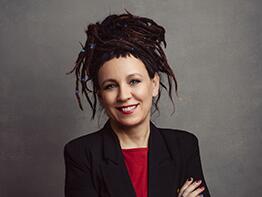
Olga Tokarczuk, Nobel Prize in Literature
Polish writer and winner of the Nobel Prize for Literature in 2018, Olga Tokarczuk's works explore themes that are close to her heart: mystery, myth and travel. Her novel The Books of Jacob is considered her masterpiece, and has enjoyed great critical and public success.
Olga Tokarczuk, one of the most influential literary voices of contemporary Poland and translated into more than 50 languages, was awarded the 2018 Nobel Prize in Literature. The Swedish Academy has praised her “narrative imagination that, with an encyclopedic passion, represents the crossing of boundaries as a form of life”.
Throughout her works, Tokarczuk explores with subtlety the themes identity, openness to the Other, wanderings, memory, time, and the human condition, that invites an engaged reading of the world and resonates with the major issues of our time. Born in 1962 in Poland to teacher parents, she grew up in a family of progressive intellectuals. She studied psychology at the University of Warsaw, a course that profoundly influenced her writing. Her literary career took off with her first noteworthy publication in 1989, followed by a series of novels that earned her growing reputation.
Among her major works available in French are Primeval and Other Times (1996), Final Stories (2004) or Flights (2007), that earned her the prestigious Polish Nike Award and the 2018 Man Booker International Prize for its translation into English. Another key work, Drive Your Plow Over the Bones of the Dead (2009), explores themes of ecology, feminism, and social criticism and was adapted into the film Spoor (2017) by Agnieszka Holland. Her magnum opus, The Books of Jacob (2014), is a monumental and sprawling historical fresco recounting the story of a heretical sect in 18th-century Poland, addressing themes such as religion, tolerance, and power. The most recent to be translated into French, The Empusium (2022), is both a delightful dialogue with The Magic Mountain by Thomas Mann, a critical re-examination of texts on women from antiquity to the 20th century.
Tokarczuk’s originality writing resides in her ability to merge genres, to blur the boundaries between reality and fiction, and to create fragmented narratives that reflect the complexity of the contemporary world and invite reflection on its most crucial issues, with a style which is both poetic and philosophical. Her work persistently seeks to revive the repressed diversity that composes the Polish nation. Her Nobel Prize came as a recognition of this rejection of homogeneity.
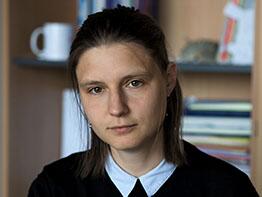
Maryna Viazovska, Fields Medal winner
Ukrainian mathematician Maryna Viazovska was awarded the prestigious Fields Medal in 2022. Her work on sphere packing has been widely recognised, making her one of the most influential mathematicians of our time.
Maryna Viazovska, born in Kyiv in 1984, discovered her passion for mathematics and physics at the age of 12. Today, as a globally recognized mathematician thanks to her fundamental discoveries in number theory and harmonic analysis, she is a professor and holder of the Chair of Arithmetic of the Swiss Federal Institute of Technology in Lausanne (EPFL). Her breakthroughs in solving the sphere-packing problem led her to be awarded the Fields Medal 2022, and thus made her the second woman to obtain this distinction.
The sphere-packing problem consists in finding the way to pack spheres in an n-dimensional space by leaving as little empty space as possible. Prior to her research, the answer was only known in dimensions two and three. In 2016, while Maryna Viazovska was still a postdoctoral researcher at the Humboldt University of Berlin, she proved that the optimal packing in dimension eight is obtained by placing the centers of the spheres on a highly symmetrical lattice, known by mathematicians for a long time by the name of E8. One week later, with her colleagues Henry Cohn, Abhinav Kumar, Stephen Miller, and Danylo Radchenko, she succeeded in identifying the optimal packing in dimension 24, the one provided by the Leech lattice, a mysterious structure discovered in 1967 that is linked to string theory and represents the largest sporadic simple group, called “the Monster Group”.
Maryna Viazovska’s extraordinary research is based on a linear optimization technique introduced by Henry Cohn and Noam Elkies in 2003. She got the brilliant idea to explore tools that had until then been completely foreign to the problem: quasi-modular forms, that she had already studied during her doctorate achieved in 2013 at the University of Bonn under the supervision of Don Zagier et Werner Müller. Today, these forms are referred to as “Viazovska's magic functions”.
After this revolutionary discovery, her mathematic methods, both algebraic, combinatorial, arithmetic, and analytical, have continuously spread to other fields and dimensions, delighting all mathematicians around the world.
Professor Maryna Viazovska has received numerous honors and awards, including the New Horizons Prize in Mathematics in 2018 and the EMS Prize in 2020, and she is and an undeniable source of inspiration for the women scientists of today and tomorrow.
